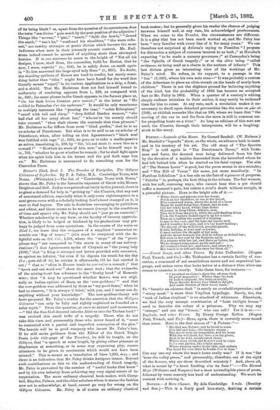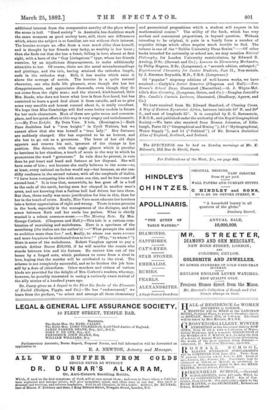additional interest from the comparative novelty of the place where
the scene is laid. "Good society" in Australia has doubtless much the same manners as good society here, still, there are differences which, where the subject is so familiar, are not without their interest. The heroine accepts an offer from a man mach older than herself, and is thought by her friends very lucky, so wealthy is her lover ; then she finds out that she has a heart, falling in love, almost at first sight, with a hero of the "Guy Livingstone" type, whom her friends contrive, by an injudicious disparagement, to make additionally attractive to her. Of course, there are the usual misunderstandings and plottings, and the tale, having attained the orthodox length, ends in the orthodox way. Still, it has merits which raise it above the average of novels. The heroine is a quite natural character, one who finds life pleasant, even though she has her disappointments, and appreciates diamonds, even though they do not come from the right man ; and the shrewd, kind-hearted, little Mrs. Reade, who does not know what love is from first-hand, but has contrived to learn a good deal about it from outside, and so to give some very sensible and honest counsel about it, is really excellent. We hope that Miss Cambridge will find some better models in future for her male characters. Most of them are quite mean and common- place, and her great effort in this way is very stagey and melodramatic. —My True Knight. By Dora Vere. 2 vols. (Remington.)—Ruth Pane doubtless had a "true knight" in Cyril Walters, but we cannot allow that she was herself a trim lady." Her fortunes are suddenly changed. She has expected to be an heiress, and she has to go out as a governess. The lover of her old days appears and renews his suit, ignorant of the change in her position. She detects, with that eagle glance which is peculiar to heroines in her situation, a touch of scorn in the way in which he pronounces the word "governess." In vain does he protest, in vain does he put heart and hand and fortune at her disposal. She will have none of him ; not because she really believes in the scorn—so, at least, every rational on-looker would say—but because, as she can- didly confesses in the second volume, with all the emphasis of italics, "I have been comparing him with some one else, and he has come off second-best." It is true that, meanwhile, he has gone off in a half to the ends of the earth, having seen her clasped in another man's arms, and not knowing that a furious bull had driven her into them. But then, there really was more justification for him in this, than for her in the touch of scorn. Really, Miss Vere must educate her heroines into a better appreciation of right and wrong. There is some promise in the book, especially in the management of the dialogue, and the scene between Ruth and her uncle has pathos. What is chiefly wanted is a robust common-sense.—The Missing Note. By Mrs. George Corbett. (Chapman and Hall.)—This tale is a curious com- bination of moralising and melodrama. Here is a specimen of the moralising (the italics are the author's) :—" What prompts the mind to ambition more than love ? and, finally, to whom can more success and more happiness be attributed than to love?" (Why," to whom ? ") Hero is some of the melodrama. Robert Vaughan agrees to pay a certain Arthur Bacon 210,000, if he will murder the cousin who stands between him and his fortune. He entices him oat of the house by a forged note, which professes to come from a rival in love, hoping that the murder will be attributed to the rival. The scheme is not completely successful, and so he finishes the job him- self by a dose of chloroform. Other murders and crimes of various kinds are provided for the delight of Mrs. Corbett's readers, who may, however, be possibly interested in seeing a curiously exact revival of the silly stories of a hundred years ago.



































 Previous page
Previous page